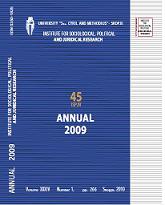Interethnic Relations
Interethnic Relations
Author(s): Mirjana MaleskaSubject(s): Social Sciences
Published by: Институт за социолошки и политичко-правни истражувања
Keywords: ethnic groups; ethnic communities; interethnic conflict; consociational democracy; Ohrid Framework Agreement
Summary/Abstract: The analysis ia a relust of a large empirical reasearch, held at early September 2009. 943 respondents answered to the questions about several aspects of their life and the life of their household. Interethnic relations, anaylised here, are one aspect of the survey "People Cantered Analyses", supported by UNDP. The main finding in these fact-finding analyses is that, while it is dangerous for social cohesion and stability of the country when the minority is dissatisfied, it is even more dangerous if majority is dissatisfied. According to this research, that is the situation in Republic of Macedonia. The majority of Macedonians, who work in large scale industry and in the public sector, have been adverssely affected by the economic crisis, and feel economically insecure. Dissatisfaction or pessimism among middle-lower class people cam negativly affect interethnic relations because this class group will instinctively demand a better status, more by pushing aside people from different ethnic backgrounds. Such people are susceptible to political manipulation, and social conflicts can easily turn into interethnic conflicts.
Journal: Annual of the Institute for Sociological, Political and Juridical Research
- Issue Year: XXXIV/2009
- Issue No: 1
- Page Range: 97-108
- Page Count: 12
- Language: English

